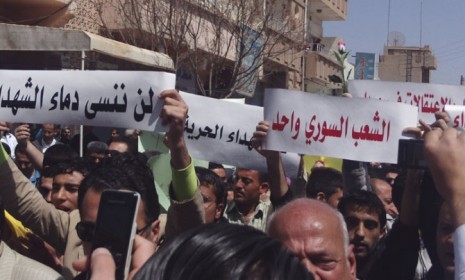Syria in crisis: Will Assad's concessions be enough?
Embattled President Bashar Al-Assad forms a new government and releases some prisoners. But will he have to give protesters more?

A free daily email with the biggest news stories of the day – and the best features from TheWeek.com
You are now subscribed
Your newsletter sign-up was successful
Fresh anti-regime protests erupted in Syria on Friday, despite concessions offered the day before by President Bashar Al-Assad. The embattled leader named a new cabinet, and announced the release of political prisoners, including those arrested during recent demonstrations. But the international outcry is building against Assad's violent suppression of the uprising, which human rights groups blame for 200 deaths, and protesters are demanding political freedoms Assad remains reluctant to grant. Will anything Assad does be enough to restore calm?
The protesters want more than Assad will give: Assad's concessions don't seem likely to satisfy the opposition, says Khaled Yacoub Oweis at Reuters. The cabinet he replaced "has little power," anyway. And he only released some political prisoners, not those accused of crimes "against the nation and citizens." That could mean the country will still have as many political detainees as it had when the protests against Assad's authoritarian rule began.
"Syria's Assad seeks to curb prayer protests"
The Week
Escape your echo chamber. Get the facts behind the news, plus analysis from multiple perspectives.

Sign up for The Week's Free Newsletters
From our morning news briefing to a weekly Good News Newsletter, get the best of The Week delivered directly to your inbox.
From our morning news briefing to a weekly Good News Newsletter, get the best of The Week delivered directly to your inbox.
Syria's leader has no good options: Assad faces a "stark choice," says Robert Baer in TIME. If the uprising doesn't die down as a result of his latest gesture, he'll have to "either crack down with unlimited violence, or meet the demonstrators' demands." But ratcheting up the violence will almost certainly push his people to the boiling point, and "a Syrian perestroika" would give "the outlawed Muslim Brotherhood" dangerous political power. Either way, Assad "is looking into an abyss."
"Showdown in Syria: Will Friday protests force Assad's hand?"
Actually, this could be a great opportunity for reform: If Assad's next move is more bloodshed, says Alon Ben-Meir in The Jerusalem Post, he'll just look like all the "impotent," aging despots falling across the Arab world. But he's young enough, at 45, and smart enough to see that he can institute the basic reforms his people want gradually, without threatening his regime's stability. Assad has "a historic opportunity to oversee, and even lead, the Arab world through a period of transformation." The question is, can he "rise to the occasion?"
"Above the fray: A wild, far-fetched idea"
A free daily email with the biggest news stories of the day – and the best features from TheWeek.com
-
 How to Get to Heaven from Belfast: a ‘highly entertaining ride’
How to Get to Heaven from Belfast: a ‘highly entertaining ride’The Week Recommends Mystery-comedy from the creator of Derry Girls should be ‘your new binge-watch’
-
 The 8 best TV shows of the 1960s
The 8 best TV shows of the 1960sThe standout shows of this decade take viewers from outer space to the Wild West
-
 Microdramas are booming
Microdramas are boomingUnder the radar Scroll to watch a whole movie